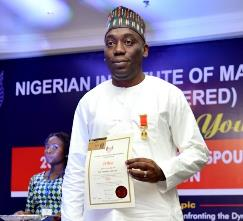…Says FG Subtly Corrupting Freight Forwarders
The erstwhile Governing Council Chairman, Council for the Regulation of Freight Forwarding in Nigeria (CRFFN), Alhaji Hakeem Olanrewaju has taken the Federal Government to the cleaners over the way and manner the council is being managed in recent times.
Olanrewaju whose tenure in office witnessed a lot of strides expressed dismay that the Federal Government was spending huge sum of money on the council without commensurate returns.
He wondered why the council has not been meeting its statutory roles and responsibilities despite the fact that more money has accrued into the council in over the years.
According Olanrewaju who is also the Managing Director and Chief Executive Officer (CEO) of Talod Oceanair Limited, approximately the amount used to kick start the administrative life of the CRFFN between 2008 to 2012 (of the first and second Governing Council) is in the average of N200 million to N250 million. Out of this approximated amount, staffs were recruited and salaries promptly paid, official vehicles were purchased, capacity buildings programmes were conducted, membership with FIATA formalized, office structures were rented across the zones, and operation head offices rented in Lagos and Abuja, international professional exchange programmes attended, among other things.
He averred that experience has shown that administering a professional council of our size was never been a rocket science just as he flayed what he called “the massive and over bloated yearly budgetary provisions” as presently obtains.
His words: “As a professional regulatory council and from what is obtainable elsewhere amongst the comity of freight forwarding nations, we do not really need all this gigantic edifices (tagged headquarters and zonal administrative offices and institutes) being put in place. What governs a professional council is the principle of discipline, transparency, moderation and prudency especially when it comes to financial management, and not the spirit of negligence, squandering and recklessness.
“Ideally in a viable and competitive freight forwarding profession, most of the said on-going projects are actually projects that the practitioners through visionary leadership of the CRFFN can easily attract through international donations via our international participation in the global freight forwarding advancement programs and empowerment schemes. In the local front, with an ideal financial administration, this said projects are achievable subject to professional administrative planning, budgeting and execution via visionary leadership”.
The former CRFFN Governing Council Chairman argued that as a professional body, the council ought to be careful and conscious to budget and expenses in likely equation and correspondence with our yearly income via yearly subscriptions, enforcement of regulatory sanctions, sales of professional publications, professional levies, donations, and corporate brand materials.
According to him, it is disheartening to note that 12 years after the registration of the CRFFN with the umbrella body, FIATA, what we can point to the International body, who had concluded a trained the trainer programme, followed by the accreditation of professional training institutions across the geo- political zones of the nation, is an endless ongoing projects of the CRFFN.
Apparently not pleased with the way the council is being run by his successors, Olanrewaju said: “What a shame of a profession, even worse, when we discover that, even the CRFFN yearly budgetary is way far above that of FIATA yearly budget. What an irony of professional inclination? Let me shock you by saying that the government is massively corrupting the leadership of the freight forwarders cum the practitioners in an obvious subtle manner such as over inflated project contracts and elephant projects”.
He averred that the practitioners now find it much rewarding and most profitable to do everything humanly possible to get elected into the CRFFN Governing Council rather than face their professional practices.
“This growing trend is dangerous and this professional albatross has to stop”, declared.
He expressed fears that the anomalies in the council were what he called “deliberate professional distractions” caused by the government.
“What happens when another government comes to power and discovers that this present trending of setting up edifices which in the future cannot be sustainable for a prudent professional practitioners whose activities are service related is a mere waste of public fund? This deliberate dubbing of our legitimate professional council as a quasi-professional council by government operatives has to stop.
In due course, we shall institute a process that will engender probity by the concerned authorities”, he added.











